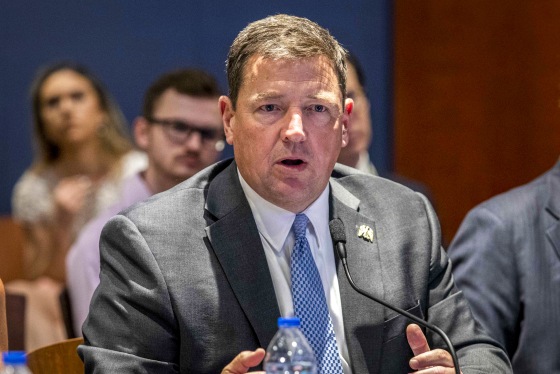The acting U.S. attorney for the District of Columbia sent a letter this week to the editor of a scientific journal for chest doctors, implying that the journal was partisan and asking a series of questions about how the publication protects the public from misinformation, whether it included competing viewpoints and whether it was influenced by funders or advertisers.
“It has been brought to my attention that more and more journals and publications like CHEST Journal are conceding that they are partisans in various scientific debates,” the letter from acting U.S. Attorney Ed Martin stated, before noting that “you have certain responsibilities.”
The letter caught the attention of First Amendment groups and some scientists, who raised concerns that it was designed to suppress academic and scientific freedom.
“It’s really unusual when you see a U.S. Attorney from the Distinct of Columbia sending a letter to a publication based in Illinois inquiring about their editorial practices, in particular, a journal from a medical organization,” said JT Morris, a senior supervising attorney for the Foundation for Individual Rights and Expression (FIRE). “That screams of a government official going after a publication because it disagrees with what the publication is saying.”
FIRE, a nonprofit civil liberties groups, has been critical of Martin, saying he's threatened "to go after speakers critical of Department of Government Efficiency" and Elon Musk.
Scientific journals build a base of what scientists understand about their fields and allow researchers to share new findings with colleagues. Before publication, credible scientific journals review submissions and send studies to outside researchers to check for errors or problematic reasoning, which is why they are called peer-reviewed.
The Trump administration has made dramatic funding and personnel cuts at federal science and medical organizations, including the Health and Human Services Department and the National Institutes of Health. Some groups, including the American Civil Liberties Union, have said the administration has targeted disfavored research topics for cuts. The administration has also made cuts at academic institutions over ideology, which has put some scientists on alert for government influence at independent journals.
The office of the U.S. attorney for the District of Columbia did not respond to an NBC News request for comment about the letter or its purpose.
The letter was originally posted on X by Dr. Eric Reinhart, a clinician, political anthropologist and social psychiatrist based in Chicago. Reinhart described the letter, in his post on X, as designed to “intimidate” and called it “fascist tactics.”
Laura DiMasi, a communications specialist with the CHEST Journal’s publisher, the American College of Chest Physicians, confirmed that the organization had received the letter posted by Reinhart.
“Its content was posted online without our knowledge,” DiMasi said. “Legal counsel is currently reviewing the DOJ request.”
The American College of Chest Physicians is a professional group with about 22,000 members in pulmonary, critical care and sleep medicine, according to its website.
A statement on the publication’s website states that CHEST applies “strict peer review standards to ensure scientific rigor.”
“As the publisher, the American College of Chest Physicians respects and supports the journal’s editorial independence,” the statement said.
In an interview, Reinhart said he published the letter on X because he hoped to push scientific journal editors, and the broader scientific community, to band together and take a stand against what he viewed as government pressure on publishers.
“My understanding is the journal did not intend to make this public,” Reinhart said, adding that he did not receive a copy of the letter from someone at the journal. “Our responsibility is to organize with one another and rally a coordinated opposition to this.”
NBC News asked two former editors of scientific journals if they had ever received letters from the Department of Justice about their publishing practices, and both said they had not.
Jeremy Berg, who was once an editor of the Science family of journals, said he interpreted the letter’s message as “we’re watching you.”
Michael Eisen, who once edited the biomedical journal eLife, said he didn’t know what to make of the letter, though he viewed it as part of the Trump administration’s "volley of attacks" on academia, universities and science.
“It’s hard to know what it is. What are they doing? I’ve just never been in this situation of providing information to the Department of Justice about something,” Eisen said, noting that journals often get inquiries from academics about their practices, but not law enforcement. “This is not an editorial query. This is from an organization that prosecutes crimes. That makes it different.”
Berg said scientists were scrambling to understand if the letter was part of a wider inquiry into scientific journals. NBC News contacted leaders of scientific journal families asking whether they had received similar letters.
Representatives of PLOS, the Proceedings of the National Academy of Sciences of the United States of America and the The New England Journal of Medicine said they had not received a similar inquiry.
Representatives from Science, Nature and JAMA, the medical journal of the American Medical Association, did not respond to a request for comment.
